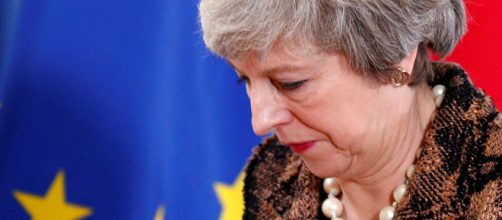With three members of the Conservative party defecting to join the new Independent Group and dissatisfaction rife in parliament, May has said she would consider giving MPs an option between no deal or delaying Brexit if her amended withdrawal agreement is turned down for a second time.
Amended Deal
May has promised MPs a vote on her amended deal by 12 March, although Downing Street would be eager to push this up if certain changes can be secured within the next week.
Although her deal was voted down in a historic defeat in January, key speakers in parliament have expressed confidence that an agreement would be supported if sufficient changes – specifically regarding the Irish Backstop – are met.
According to Sir Graham, the Brexit negotiations and British politics as a whole are starting to look like “lions led by donkeys,” but despite this he does feel that “When the right compromise is offered, we should pull together behind the prime minister and help her to deliver our exit from the European Union.”
He further stated, “This is not a time to make the best the enemy of the good, and most MPs are in a mood to compromise, but the danger of this backstop becoming permanent is a real one, and it has to be tackled.”
This does suggest that there’s growing support for May and many MPs may back her deal once assurances have been made that the backstop will not be permanent.
Delay or No Deal
Although there’s conditional support for May’s deal, other MPs and EU officials have suggested that a delay might be inevitable, even if she is able to get her deal through.
According to Michel Barnier, chief negotiator for the EU claimed he does not believe it would be possible for the required legislation for the UK to leave can be passed by 29 March. Instead, he believes “there would have to be an extension.”
Further to this, we already know there’s cross-party support of an extension to Article 50 in parliament, as this was a key feature of many of the amendments put forward by MPs. Although they were all voted down, it did appear to be a common theme with many MPs stating disbelief that it would be physically possible for us to have a completed Brexit deal plus required legislation in place by the intended leave date.
Pro-EU ministers including Amber Rudd, work and pensions secretary, David Gauke, the justice secretary, and Greg Clark, the business secretary, have been among MPs privately calling for a delay to Brexit in order to avoid a no-deal situation.
In contrast, foreign secretary Jeremy Hunt and Commons leader Andrea Leadsom have argued that “the active pursuit of a delay to Brexit, with no purpose beyond frustration, is a betrayal of the referendum result.” A line which has been regularly regurgitated by no-deal and hard-line Brexit supporters who are against anything other than leaving on 29 March regardless of whether or not a deal has been reached.
Although they’re not supporters of delaying Brexit, Hunt and Leadsom have also condemned those who are “turning their backs on a far more attractive option in the PM’s deal”, believing voting against May’s latest deal for the sake of “embrac[ing] no deal” would cause “disruption and uncertainty for businesses and our people”.
Similarly, justice minister Rory Stewart has argued that a delay to Brexit would create a “zombie world,” where people do not know where we are going and that it would “resolve nothing.”
'Three Tests'
With Britain due to leave the EU on 29 March, The European Research Group (ERG) of Eurosceptic Tories have brought together a group of MP lawyers to dissect any deal put in front of parliament on 12 March to ensure it meets the demands of MPs.
In response to this assembly, the group has created three tests which the withdrawal agreement must meet in order to secure the support of this group.
The first test is to ensure there is a “clearly worded, legally binding, treaty-level clause” overriding the text of the agreement.
This cannot be wording which is “simply re-emphasising or re-interpreting” any aspect of the original agreement, which is the second test. The third test is whether the agreement offers a “clear and unconditional route out of the [Irish] Backstop if trade talks fail.”
Support
Amongst all the talks of a delayed or no deal Brexit, there has been a growth in support for the Prime Minister, with the hopes that if issues surrounding the Irish Backstop can be resolved then MPs may find May’s deal a satisfying compromise between hard line and soft Brexiters alike, without needing to call a second referendum or cancel Brexit entirely: something MPs are reluctant to do due to claims this would go against the will of the people, despite mounting support for a Peoples Vote on any final decisions.
Rory Stewart has claimed extending Brexit would be “a worse option than the Prime Minister’s deal,” a comment which is reflected in Leadsom and Hunt’s article for the Daily Telegraph in which they stated there is a “far more attractive option in the PM’s deal” when asked whether they would back no deal.
According to Stewart, “people are becoming more pragmatic; they’re recognising much more than they did in the past that there are a limited number of alternatives to [May’s deal] and the alternatives are worse.” He goes on to claim that MPs are increasingly supporting the view that the proposed deal “will allow us to move on… give business certainty… [and] bring investment into the country.”
Alternative
Despite this debate ongoing in the UK, some are still convinced Britain will end up part of the EU eventually. Wolfgang Schäuble, president of Germany’s Bundestag, articulated this over the weekend, telling Funke Media Group “I believe Britain will either not leave the EU at all or come back at some point.”


